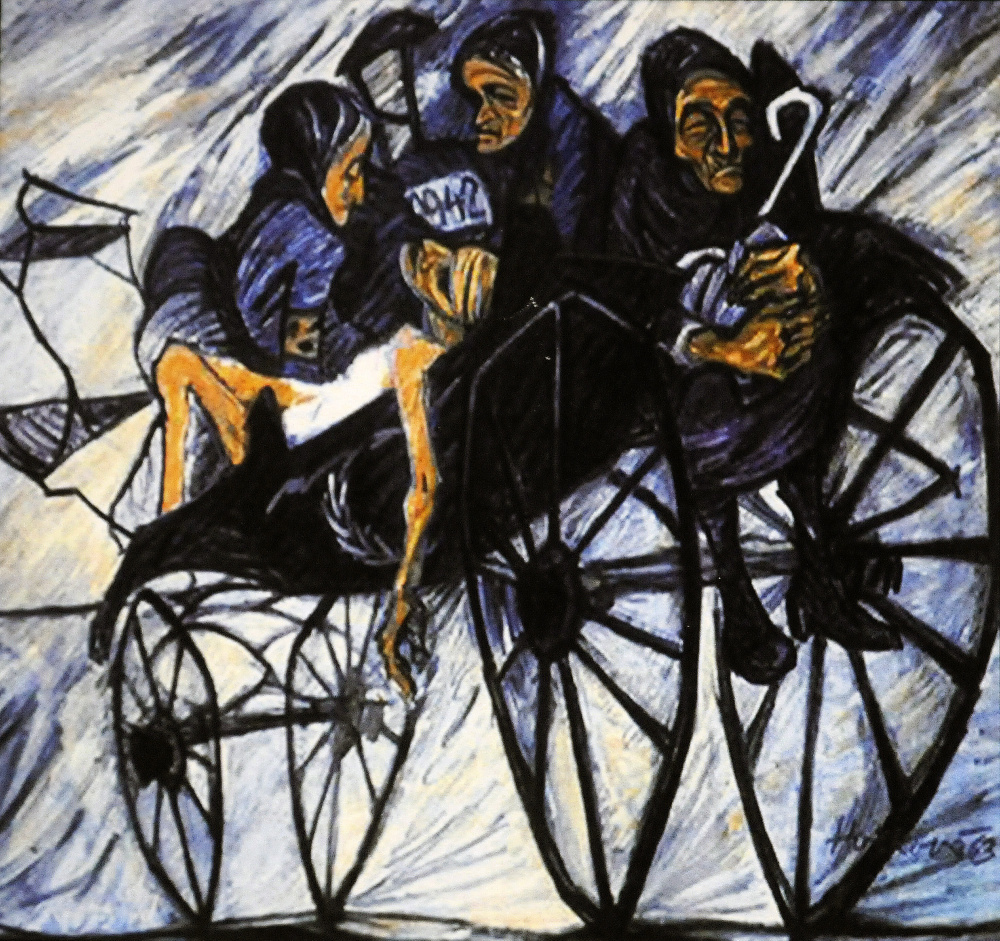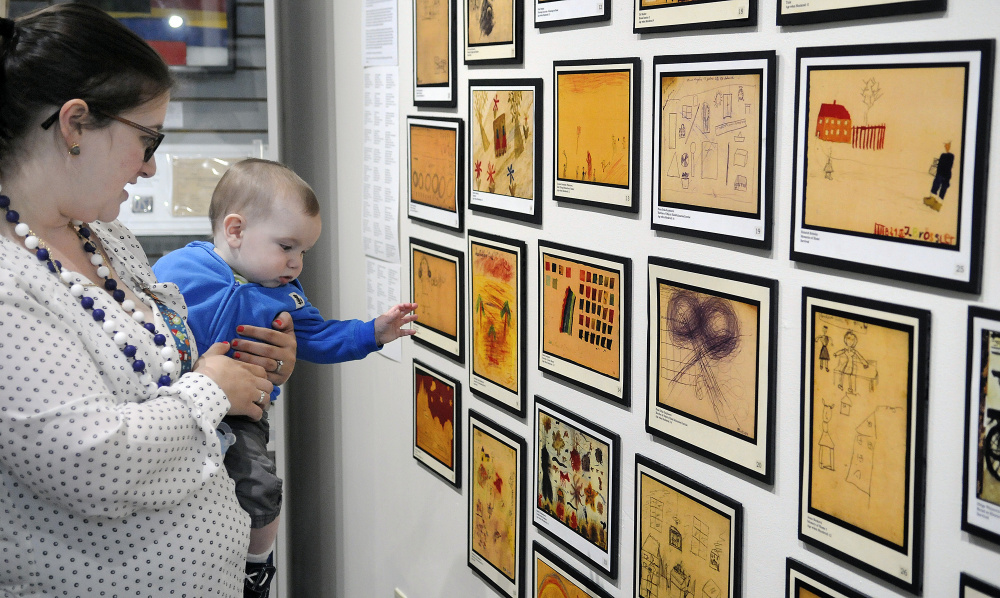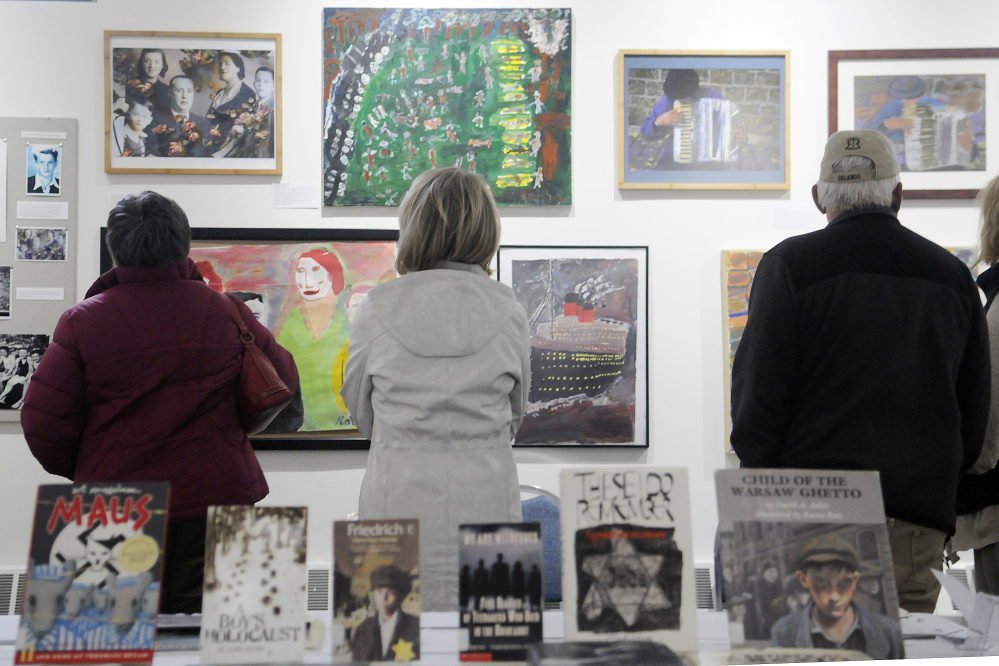AUGUSTA — Charles Rotmil’s mother and sister were killed at the hands of the Germans in a train crash that he and his brother survived in 1940. His painting of the crash is one of several of his works that are on display as a part of a new exhibit at the Holocaust and Human Rights Center of Maine on the campus of the University of Maine at Augusta.
The opening of the exhibit, entitled “Those People … Well, They’re Not People at All: Children’s Reactions to the Holocaust,” drew more than 40 people to the center. Several speakers, including Rotmil, shared stories and works of art about their memories of the horrible atrocities carried out by the Nazis.
Rotmil, 83, who became a photographer and painter among other things after coming to the U.S. in the ’40s, said he has heard comparisons of Donald Trump to Hitler, but he laughed them off.
“I can’t stand Donald Trump, but he’s not Hitler,” Rotmil said. “He’s not smart enough, but it’s scary because he could become president.” He said he doesn’t trust any political speech because he too often hears Hitler.
Rotmil said talking about and painting about his experiences has been therapeutic. Rotmil said he has old pictures that he still wants to paint.
“They say that when you talk through something, it helps you,” Rotmil said. “How do you heal from having your parents murdered? I don’t forgive (the Nazis), but painting helps me deal with the subject.”
Executive director Liz Helitzer said the idea for the exhibit came from a book she first read when she was 12 and rediscovered 20 years later when visiting her childhood home on Long Island. The book, “Elli: Coming of Age in the Holocaust,” is a memoir that Helitzer said is the only book that she started reading again immediately after she finished it.
“It’s always stayed with me,” Helitzer said. “I was so moved by the honesty of it, and you really get a sense of the complexity of emotions this family was experiencing.”
Unlike Rotmil, Danna Hayes’ grandmother did not want to speak about her experience in the Holocaust. Hayes, of Bath, spoke about her quest to find out information about her grandmother by doing research at the U.S. Holocaust Memorial Museum in Washington, D.C.
“It hung over our family like a fog, and she never wanted to talk about it,” said Hayes, who brought her 7-month old son Eli to the event. “She was very afraid to tell her story even after she came to the United States because she thought the Nazis would find her. We never knew a lot of the details of her story, so at best, some parts of my family’s history are educated guesses.”
Hayes, the director of public policy for the Maine Women’s Lobby, said it’s very important that her son knows about his past and his great-grandmother’s experience, but she said the real lesson is about not being a bystander.
“Although humans are capable of terrible things, you have to play a role when you see wrongdoing and not just stand back and watch,” Hayes said. “There is incredible evil in the world, and the only thing that can stop it is people standing up.”
Helitzer said there were between 1.1 and 1.5 million children murdered during the Holocaust, and some drawings, reflections and stories created by victims have been preserved. The exhibit “shines a spotlight on the artwork and literature of children lost, children who survived and future generations who have been deeply moved by the Holocaust.
“It’s such a devastating number and a number too hard to grasp,” she said. “But it isn’t about numbers; it’s about these very specific individual stories.”
Another survivor, Ruth Bookey, told her story and read several of her poems about how she fled Nazi Germany with her family during the late 1930s. Kevin Martin, a rising junior at UMA, read one of his five fictional letters written from a father to his son, which was awarded one of several exhibit scholarships.
The exhibit also features artifacts, drawings and paintings, an essay by Gardiner Area High School student Cassidy Blake, a fictional story from Messalonskee High School student Jacob Buzzell and poetry from local students.
The exhibit will run through Friday, Aug. 12, at the Michael Klahr Center. Admission is free.
Jason Pafundi — 621-5663
Twitter: @jasonpafundiKJ
Send questions/comments to the editors.






Comments are no longer available on this story